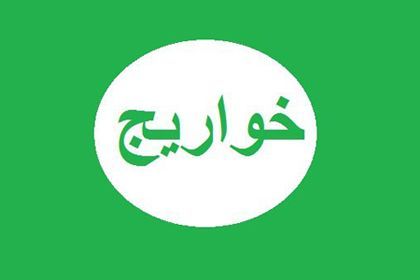Amir al-Mu’mineen ‘Ali (radiAllahu anhu) treated the Kharijites as Muslims, both before and after the battle. No sooner had the battle ended but he issued orders to his troops, saying:
“Do not pursue anyone who is fleeing, do not finish off anyone who is wounded, and do not mutilate anyone who has been killed.”
Shaqeeq ibn Salamah, who was known as Abu Wa’il, one of the jurists of the Tabi’oon who was present with ‘Ali during his battles, said: ”
‘Ali did not take any female prisoners either on the day of the Camel or on the day of Nahrawan.[1]“
After the battle of Nahrawan, he took the property of the slain to Kufah and said: “Whoever recognizes anything, let him take it.” The people started taking things until there was one pot left, then a man came and took it.[2] ‘Ali (radiAllahu anhu) did not divide anything among his troops except what the Kharijites had brought into battle with them: weapons and horses only.
Amir al-Mu’mineen ‘Ali (radiAllahu anhu) did not regard the Kharijites as disbelievers. Before the battle, he tried to bring them back to the main body of Muslims, and many of them did come back. He exhorted them and reminded them of the seriousness of fighting.
Ibn Qudamah said:
“He did this because his aim was to restrain them and fend off their evil, not to kill them. If it was possible to achieve this by talking, that should take precedence over fighting because of the harm that may be caused to both parties as a result of fighting. This indicates that the Kharijites were a group of Muslims, as was stated by many of the scholars.”[3]
‘Ali (radiAllahu anhu) was asked whether they were disbelievers.
He said: “They have fled from disbelief.” He was asked: “Are they hypocrites?” He said: “The hypocrites only remember Allah a little.” He was asked: “What are they?” He said: “They are people who transgressed against us, so we fought them.” [4]
According to another report:
“They are people who transgressed against us, therefore we prevailed over them.” According to a third report: “They are people upon whom a fitnah came, and they became blind and deaf.”[5]
Ali (radiAllahu anhu) also offered this advice to his army and to the Muslim Ummah after him:
“If they go against a just ruler, then fight them, but if they go against an unjust ruler, do not fight them, because they have a reason.”[6]
It may be noted that ‘Ali (radiAllahu anhu) regretted and was grieved by the fighting in the Battle of the Camel and Siffeen, while he expressed satisfaction and contentment about fighting the Kharijites.
Ibn Taymiyyah [Rahimahullah]said:
“The texts and scholarly consensus differentiate between the two cases. He fought the Kharijites on the basis of a text from the Messenger of Allah (sallallahu alaihi wasallam) and was happy about that, and none of the Companions objected to that. As for his fighting on the’ day of Siffeen, he showed a great deal of sorrow and regretted it.”[7]
Footnotes:
[1] Sunan al-Kubra/Baihaqi [8/182]
[2] Al-Talkhees ul Habeer [4/47]
[3] Fath ul Bari [12/300,301], Nayl al-Awtar [8/182]
[4] Musannaf Abdur Razzaq [10/150], Musannaf ibn Abi Shaybah [10, 332]
[5] Musannab ibn Abi Shaybah [10/320,324], Al aitisaam/ Shaatibi[1/62]
[6] Musannaf ibn Abi Shaybah [10/320], Fath ul Bari [12/301]
[7] Majmoo al-Fatawa [28/514]
[Taken from: Rightly guided Caliphs by Dr. Ali Sallabi]
Download PDF: [E-Book] The most correct opinion concerning the takfeer of Khawarij
